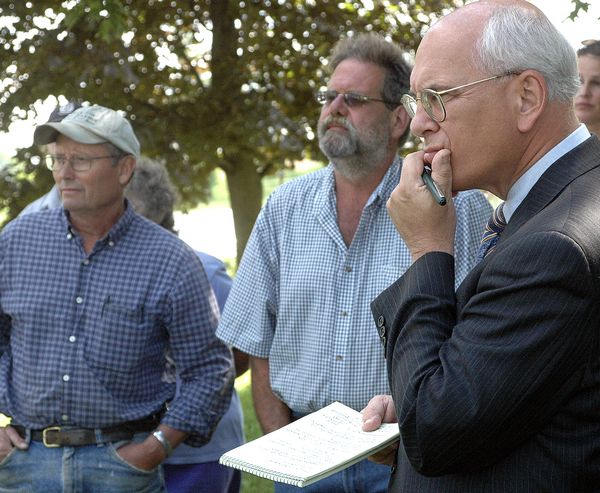Subscriptions
Menu
Advertisements
Dairy crisis: Farmers ask Tonko for help
7/1/2009 |
By Patsy Nicosia |

Fifteen years ago, farmers were getting $13 for their milk.
Today? Not even $11.
And if that doesn’t change—fast—there won’t be any of them left in Schoharie County by the end of the year.
That’s just a little of what dairymen shared Monday with Congressman Paul Tonko in a crisis meeting at John and Terran Radliff’s Cobleskilll farm.
“The milk check comes, you look at the bills and the people you have to pay and it’s not even close,” said Mr. Radliff.
“We’ve lost 50 percent of our income…”
“The worst is yet to come,” said Middleburgh farmer Sandie Prokop.
“Dairy farmers are bleeding,” said Tammy Graves, the county’s first Ag Marketing specialist and now a spokesman for United States Dairy Farmers.
“It won’t be long until they’re in cardiac arrest.”
The reasons for the dairy crisis are many; some of them are tied to the national and even the international recession, the farmers told Congressman Tonko.
But really? It doesn’t matter anymore.
Unless something’s done quickly, they said, grocery stores will be filled with food produced somewhere else.
Senator Kirsten Gillibrand has proposed changes to the Milk Income Loss Contract, a safety net which boosts farmers’ milk prices when they fall below $16.94 per hundred pounds.
Mr. Radliff said that might be a start—but said some in the industry are concerned that might require opening up the Farm Bill, which doesn’t expire till 2012.
“That could be a whole can of worms,” he said, suggesting, instead, some sort of emergency cash infusion like the one New York State made in ’06 or even federal Stimulus monies.
“Just call a horse a donkey,” he said.
Changing federal dairy policy is difficult, Congressman Tonko admitted; divisions come not along party lines, but geographical ones and he’s been meeting with fellow legislators to try to strategize a way around that.
“We’re trying to throw it all [solutions] out on the table,” he said.
“I know I have to hear from everyone, but farmers are the most important link in the chain.”
Longterm solutions could include quotas, changes to the milk marketing order, and a different pricing formula.
“But if you take on too big a mouthful, you’re going to choke,” Mr. Radliff cautioned Congressman Tonko.
Increasing MILC payments and lifting the cap on them retroactively might work, dairymen said, but only if it’s done immediately.
Congressman Tonko agreed that speed is important—but so is an answer that will work.
“I’m trying to find out what we can do quickly without opening up the 2012 Farm Bill,” he said.
And that comes back to some sort of emergency payments or Stimulus money, Mr. Radliff said.
“Agriculture is the same thing to us as General Motors is to Flint [Michigan],” he added.
“I wish they’d give us a quarter—a tenth—or what they gave GM.”
While Congress is on break, Congressman Tonko said he’ll take these ideas and concerns to the legislators he’s already met with and ask them to take them to their farmers.
“If anyone asks, ‘Why dairy?’ tell them because that’s the segment of agriculture that’s hurting the worst,” added David Huse, a W arnerville beef farmer.









